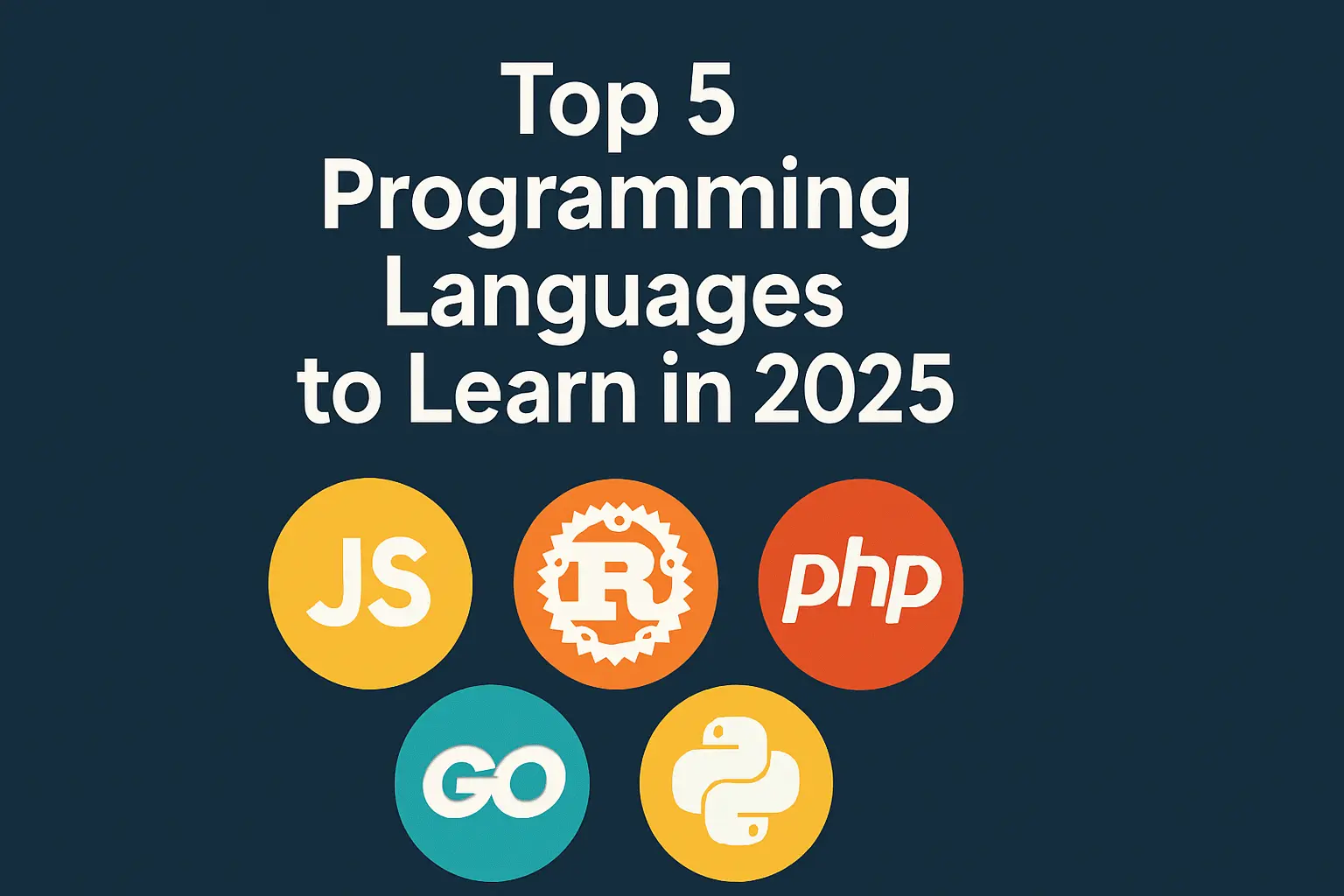In an era defined by rapid technological growth, learning to code remains one of the most valuable skills you can acquire. Whether you’re a complete beginner, a seasoned developer looking to stay relevant, or a professional pivoting into tech, choosing the right programming language is key. As we move into 2025, the digital landscape continues to evolve with advancements in AI, cloud computing, cybersecurity, and web development shaping industry needs.
Here are the top 5 programming languages to learn in 2025, based on demand, versatility, and future potential.
1. Python
Why Learn Python? Python remains at the top due to its simplicity, versatility, and extensive ecosystem. It’s widely used in data science, machine learning, AI, automation, and web development. Python’s syntax is beginner-friendly, making it an ideal first language.
Key Uses:
- Machine Learning & AI
- Data Analysis & Visualization
- Web Development (Django, Flask)
- Automation/Scripting
Pros:
- Easy to learn and write
- Massive community support
- Tons of libraries and frameworks
Cons:
- Slower performance compared to compiled languages
- Not ideal for mobile app development
2025 Outlook: Python will remain dominant in the data and AI fields. Its widespread use in academia and industry secures its place as a must-learn language.
Example Code:
import random
def generate_random_number():
return random.randint(1, 100)
print("Random number:", generate_random_number())2. JavaScript
Why Learn JavaScript? JavaScript is the backbone of the modern web. If you’re interested in front-end or full-stack web development, JavaScript is non-negotiable. It’s also extending into backend development with Node.js.
Key Uses:
- Web Development (Frontend & Backend)
- Mobile App Development (React Native)
- Game Development
Pros:
- Runs in every modern browser
- Huge demand in the job market
- Supported by powerful frameworks (React, Angular, Vue)
Cons:
- Inconsistent browser behavior (though improving)
- Can be challenging to debug
2025 Outlook: As web applications become more dynamic and complex, JavaScript and its frameworks will continue to evolve and stay relevant.
Example Code:
function generateRandomNumber() {
return Math.floor(Math.random() * 100) + 1;
}
console.log("Random number:", generateRandomNumber());3. Go (Golang)
Why Learn Go? Developed by Google, Go is known for its performance, simplicity, and concurrency capabilities. It’s a great choice for backend development, cloud infrastructure, and DevOps.
Key Uses:
- Cloud Computing
- Backend Services
- Microservices
Pros:
- Fast and efficient
- Easy to deploy
- Excellent concurrency support
Cons:
- Limited libraries compared to older languages
- Error handling is a bit verbose
2025 Outlook: Go is becoming increasingly popular among companies building scalable cloud-native apps. As cloud infrastructure grows, so does Go’s relevance.
Example Code:
package main
import (
"fmt"
"math/rand"
"time"
)
func generateRandomNumber() int {
rand.Seed(time.Now().UnixNano())
return rand.Intn(100) + 1
}
func main() {
fmt.Println("Random number:", generateRandomNumber())
}4. Rust
Why Learn Rust? Rust is loved for its performance and memory safety. It’s often seen as a modern alternative to C and C++. Ideal for systems programming, blockchain, and performance-critical applications.
Key Uses:
- Systems Programming
- Game Engines
- Blockchain Development
Pros:
- Extremely fast
- Prevents memory errors
- Strong community
Cons:
- Steep learning curve
- Fewer job openings (though growing)
2025 Outlook: Rust’s adoption is growing steadily in performance-sensitive domains. Major companies like Microsoft and Amazon are investing in Rust-based projects.
Example Code:
use rand::Rng;
fn generate_random_number() -> i32 {
let mut rng = rand::thread_rng();
rng.gen_range(1..=100)
}
fn main() {
println!("Random number: {}", generate_random_number());
}5. PHP
Why Learn PHP? PHP powers over 75% of websites on the internet, including major platforms like WordPress and Facebook. It remains a practical choice for server-side web development and content management systems.
Key Uses:
- Web Development
- Server-side Scripting
- Content Management Systems (e.g., WordPress)
Pros:
- Easy to deploy
- Large ecosystem and hosting support
- Excellent integration with databases
Cons:
- Viewed as outdated by some developers
- Inconsistent language design
2025 Outlook: While not as trendy as some newer languages, PHP remains deeply embedded in the web. It’s especially valuable for backend developers and WordPress ecosystem professionals.
Example Code:
<?php
function generateRandomNumber() {
return rand(1, 100);
}
echo "Random number: " . generateRandomNumber();
?>Final Thoughts: How to Choose the Right Language for You
The best language for you depends on your goals:
- Interested in AI/Data Science? Start with Python.
- Want to build websites or web apps? JavaScript and PHP are essential.
- Backend and Cloud Infrastructure? Go is a top pick.
- Systems-level or blockchain work? Rust is powerful.
No matter which path you choose, remember that learning the fundamentals of programming is more important than the specific language. Once you’re comfortable with one, picking up others becomes significantly easier.
So in 2025, don’t just learn a language—start building something with it.
